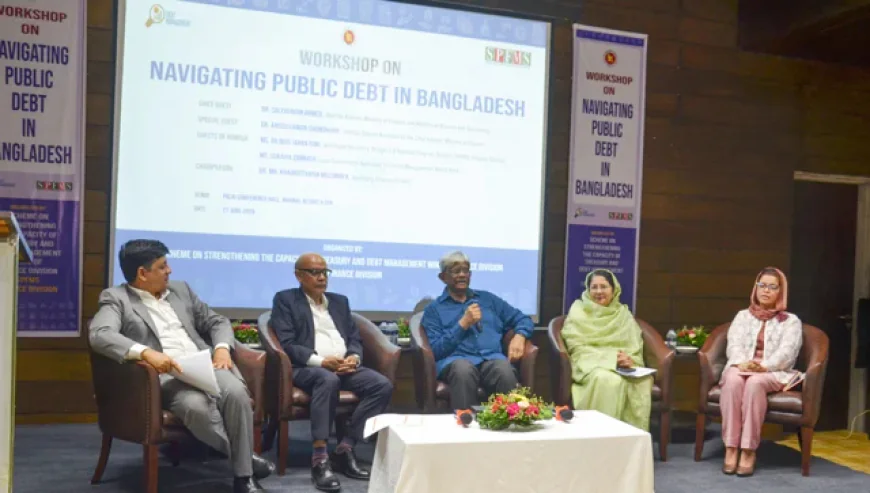03/03/2026

Refrain from unnecessary, large-scale projects: Finance Adviser
Staff Correspondent | Published: 2025-06-28 20:32:45

Finance Adviser Dr Salehuddin Ahmed urged all concerned to refrain from approving unnecessary and large-scale development projects that could jeopardise the country’s debt sustainability.
“Before approving any big project, we must assess whether the demand is justified, whether the project is feasible, and whether it promises long-term benefits,” he said while speaking as the chief guest at a workshop titled “Navigating Public Debt in Bangladesh”at a local hotel in Gazipur on Friday.
“We must now translate our strategies into concrete actions. Debt management is not the government’s responsibility alone — it’s a shared obligation involving the corporate sector, Bangladesh Bank, the bond market, and private actors,” he said.
The workshop was organised by Strengthening Public Financial Management Programme to Enable Service Delivery (SPFMS), Finance Division.
The Adviser stressed the importance of a symbiotic relationship among all stakeholders to maintain fiscal stability amid a volatile global financial environment.
He also underlined the need for real-time, integrated data systems.“Real-time data and institutional interoperability are critical to managing our debt effectively — and that remains one of our biggest challenges.”
Dr Anisuzzaman Chowdhury, special assistant of the Finance Ministry was present as the special guest.
Dr Anisuzzaman emphasised the need for various ministries and departments to work together to ensure coordination in the government’s debt management efforts.
He also urged all relevant stakeholders to convene soon to take effective decisions on the matter.
Bilkis Jahan Rimi, Additional Secretary of the Finance Division and National Program Director of SPFMS and Suraiya Jannat, Lead Governance Specialist of the World Bank were present among others.
Finance Division secretary Dr. Khairuzzaman Mozumder stressed the importance of innovative planning in debt strategies to ensure fiscal sustainability.
He said external borrowing opportunities becoming slimmer and focus should now shift to domestic borrowing.
He also underscored the need to build a stronger professional base by increasing the number of skilled experts with in-depth knowledge of debt management.
Presentations were made by Hasan Khaled Foisal, Additional Secretary (Treasury and Debt Management) Mohd Rashedul Amin, Joint Secretary, Farid Ahmed, Deputy Secretary, and Arindam Roy, Economist at the IMF.
Moderators of the sessions included Additional Secretaries Shirajun Noor Chowdhury (Budget and Macroeconomics) and Dr Ziaul Abedin (Macroeconomics-1), both from the Finance Division.
Around 75 officials from the Finance Division, Economic Relations Division, Department of National Savings, Bangladesh Bank and the World Bank attended the workshop.
IMF Economist Arindam Roy, joining virtually, said that Bangladesh is progressing with strategic reforms in debt management to overcome fiscal and structural challenges.
He observed that the share of external debt increased from 37% in FY2023 to 43% in FY2024 due to Taka depreciation, while inflation and rising interest rates have sharply increased debt servicing costs.
He emphasised the need to boost institutional capacity, provide training, and foster national ownership to ensure the sustainability of ongoing debt reforms.
Editor & Publisher : Md. Motiur Rahman
Pritam-Zaman Tower, Level 03, Suite No: 401/A, 37/2 Bir Protik Gazi Dastagir Road, Purana Palton, Dhaka-1000
Cell : (+88) 01706 666 716, (+88) 01711 145 898, Phone: +88 02-41051180-81